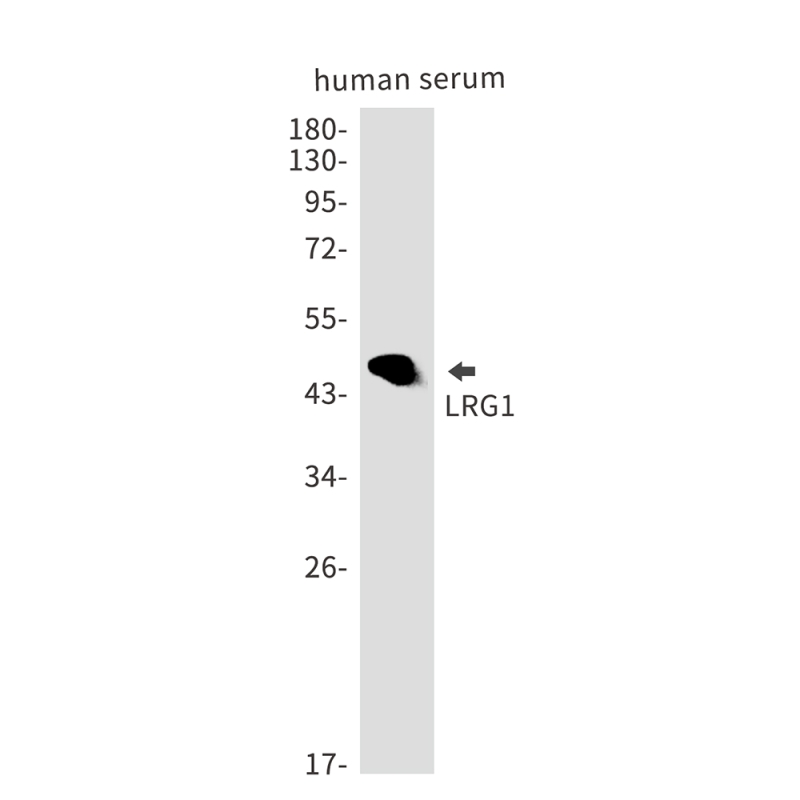
| WB | 1/500-1/1000 | Human,Mouse,Rat |
| IF | 1/20 | Human,Mouse,Rat |
| IHC | 1/50-1/100 | Human,Mouse,Rat |
| ICC | 技术咨询 | Human,Mouse,Rat |
| FCM | 咨询技术 | Human,Mouse,Rat |
| Elisa | 咨询技术 | Human,Mouse,Rat |
| Aliases | LRG1; LRG; Leucine-rich alpha-2-glycoprotein; LRG |
| Entrez GeneID | 116844 |
| WB Predicted band size | Calculated MW: 38 kDa; Observed MW: 48 kDa |
| Host/Isotype | Rabbit IgG |
| Antibody Type | Primary antibody |
| Storage | Store at 4°C short term. Aliquot and store at -20°C long term. Avoid freeze/thaw cycles. |
| Species Reactivity | Human |
| Immunogen | A synthetic peptide of human LRG1 |
| Formulation | Purified antibody in TBS with 0.05% sodium azide,0.05%BSA and 50% glycerol. |
+ +
以下是关于LRG1抗体的3篇参考文献及其摘要概括:
1. **文献名称**: *LRG1 promotes angiogenesis by modulating endothelial TGF-β signalling*
**作者**: Wang X, et al.
**摘要**: 该研究通过使用抗LRG1抗体阻断LRG1蛋白功能,发现LRG1通过增强TGF-β信号通路促进血管生成。实验表明,抑制LRG1可减少小鼠模型中病理性血管新生,提示其作为抗血管生成治疗的潜在靶点。
2. **文献名称**: *Anti-LRG1 antibody mitigates renal fibrosis by modulating macrophage polarization*
**作者**: Li Y, et al.
**摘要**: 研究利用抗LRG1抗体干预慢性肾病模型,发现LRG1通过调控巨噬细胞向促纤维化表型分化加剧肾纤维化。抗体治疗显著减少胶原沉积,表明靶向LRG1可能为纤维化疾病提供新策略。
3. **文献名称**: *LRG1 as a diagnostic biomarker in colorectal cancer: A study using immunohistochemical analysis*
**作者**: Zhang H, et al.
**摘要**: 通过免疫组化(使用特异性抗LRG1抗体)分析结直肠癌组织,发现LRG1在肿瘤间质中高表达,且与患者预后不良相关。研究表明LRG1可作为癌症进展的生物标志物及治疗靶点。
4. **文献名称**: *Neutralizing LRG1 antibody attenuates ocular angiogenesis in a murine model*
**作者**: Chen J, et al.
**摘要**: 该研究开发了一种中和性抗LRG1抗体,并在小鼠视网膜病变模型中验证其效果。结果显示,抗体显著抑制异常血管生成,提示LRG1在糖尿病视网膜病变等眼部疾病中的关键作用。
Leucine-rich alpha-2-glycoprotein 1 (LRG1) is a secreted glycoprotein belonging to the leucine-rich repeat (LRR) superfamily, characterized by its signature LRR domains involved in protein-protein interactions. Initially identified in serum, LRG1 has garnered attention for its multifaceted roles in pathological processes, including angiogenesis, inflammation, and immune regulation. It is upregulated in various diseases, such as cancer, diabetic retinopathy, rheumatoid arthritis, and inflammatory bowel disease, often correlating with disease progression or severity.
LRG1 promotes pathogenic angiogenesis by modulating TGF-β signaling pathways, particularly through interactions with endoglin on endothelial cells, driving abnormal blood vessel formation in conditions like cancer and ocular disorders. In cancer, LRG1 is linked to tumor growth, metastasis, and therapy resistance, making it a potential biomarker or therapeutic target. Its involvement in immune dysregulation includes skewing macrophage polarization toward a pro-inflammatory phenotype.
Antibodies targeting LRG1 are essential tools for studying its expression, localization, and functional mechanisms. They enable diagnostic applications (e.g., detecting LRG1 levels in patient sera) and therapeutic exploration, such as blocking LRG1-mediated pathways to inhibit pathological angiogenesis or inflammation. Recent studies also highlight LRG1's role in fibrosis and metabolic disorders, expanding its relevance across diverse research fields. Developing high-specificity, neutralizing anti-LRG1 antibodies remains a focus for both mechanistic research and clinical translation.
×